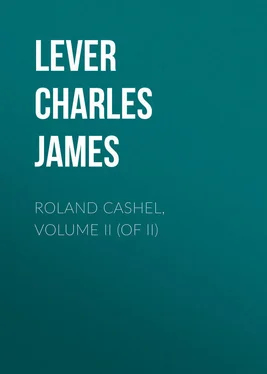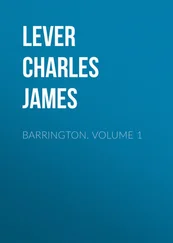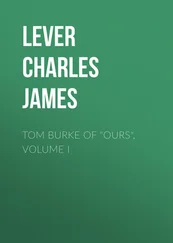Charles Lever - Roland Cashel, Volume II (of II)
Здесь есть возможность читать онлайн «Charles Lever - Roland Cashel, Volume II (of II)» — ознакомительный отрывок электронной книги совершенно бесплатно, а после прочтения отрывка купить полную версию. В некоторых случаях можно слушать аудио, скачать через торрент в формате fb2 и присутствует краткое содержание. Жанр: literature_19, foreign_antique, foreign_prose, на английском языке. Описание произведения, (предисловие) а так же отзывы посетителей доступны на портале библиотеки ЛибКат.
- Название:Roland Cashel, Volume II (of II)
- Автор:
- Жанр:
- Год:неизвестен
- ISBN:нет данных
- Рейтинг книги:5 / 5. Голосов: 1
-
Избранное:Добавить в избранное
- Отзывы:
-
Ваша оценка:
- 100
- 1
- 2
- 3
- 4
- 5
Roland Cashel, Volume II (of II): краткое содержание, описание и аннотация
Предлагаем к чтению аннотацию, описание, краткое содержание или предисловие (зависит от того, что написал сам автор книги «Roland Cashel, Volume II (of II)»). Если вы не нашли необходимую информацию о книге — напишите в комментариях, мы постараемся отыскать её.
Roland Cashel, Volume II (of II) — читать онлайн ознакомительный отрывок
Ниже представлен текст книги, разбитый по страницам. Система сохранения места последней прочитанной страницы, позволяет с удобством читать онлайн бесплатно книгу «Roland Cashel, Volume II (of II)», без необходимости каждый раз заново искать на чём Вы остановились. Поставьте закладку, и сможете в любой момент перейти на страницу, на которой закончили чтение.
Интервал:
Закладка:
Each, however, looked to see his neighbor “shown up;” and while one said, “What a character could be made of old Sir Andrew, with his vulgarity, his deafness, and his gluttony!” another thought that Downie Meek, in his oily smoothness, his sighings, and his “dear me’s,” would be admirable, – all the ladies averring that Lady Kilgoff would be a perfect embodiment of Lady Teazle as Sir Peter suspected and Joseph intended her to be.
Fears for individual safety were merged in hopes of seeing others assailed, and it was in something like a flutter of expectancy that the party assembled in the drawing-room before dinner. Great was their surprise to find that Mr. Linton did not make his appearance. The dinner was announced, but he never came, and his place vacant at the foot of the table was the continual suggester of every possible reason for his absence. If Lady Kilgoff could not divest herself of a certain terror, – vague and meaningless, it is true, – the dread she felt proceeded from knowing him to be one whose every act had some deep purpose; while others were then canvassing his absence in easy freedom, she took the first opportunity of asking Cashel whether he were in the secret, or if it were really true that Linton had not communicated, even with him, about his departure.
“I am no better informed than my friends here,” said Roland; “and, to say truth, I have given little thought about the matter. We have not, as you are aware, of late seen so much of each other as we used once; he has himself rather drawn off me, and I have left the interval between us to widen, without much regret.”
“Remember, however, what I told you: he can be a terrible enemy.”
Cashel smiled calmly as he said, “I have consorted with men whose vengeance never took longer to acquit than the time occupied in drawing a knife from the sleeve or a pistol from the girdle. I care very little for him whose weapon is mere subtlety.”
“It is this over-confidence makes me fear for you,” said she, anxiously; “for, I say again, you do not know him.”
“I wish I never had,” said Cashel, with an earnestness of voice and accent. “He has involved me in a hundred pursuits for which I feel neither taste nor enjoyment. To him I owe it that pleasure is always associated in my mind with mere debauch; and the only generosity he has taught me has been the spendthrift waste of the gaming-table.”
“Could you not find out something of him, – when he went, and in what direction?” said she, anxiously. “I cannot tell you why, but my heart misgives me about his departure.”
More in compliance with her scruples than that he deemed the matter worth a thought, Cashel left the room to make inquiries from the servants; but all he could learn was, that Mr. Linton arose before daybreak and left the house on foot, his own servant not knowing in what direction, nor having heard anything of his master’s previous intention.
His intimacy with the family at the cottage left it possible that they might know something of his movements and Cashel accordingly despatched a messenger thither to ask; but with the same fruitless result as every previous inquiry.
While Cashel was following up this search with a degree of interest that increased as the difficulty augmented, he little knew how watchfully his every word and gesture was noted down by one who stood at his side. This was Mr. Phillis, who, while seeming to participate in his master’s astonishment, threw out from time to time certain strange, vague hints, less suggestive of his own opinions than as baits to attract those of his master.
“Very odd, indeed, sir, – very strange; so regular a gentleman, too, – always rising at the same hour. His man says, he ‘s like the clock. To be sure,” added he, after a pause, “his manner is changed of late.”
“How do you mean?” asked Cashel, hurriedly.
“He seems anxious, sir, – uneasy, as one might say.”
“I have not perceived it.”
“His man says – ”
“What care I for that?” said Cashel, impatiently. “It is not to pry into Mr. Linton’s habits that I am here, it is to assure myself that no accident has happened to him, and that if he stand in need of my assistance, I shall not be neglecting him. Tell two of the grooms to take horses and ride down to Killaloe and Dunkeeran, and ask at the inns there if he has been seen. Let them make inquiry, too, along the road.” With these directions, hastily given, he returned to the drawing-room, his mind far more interested in the event than he knew how to account for.
“No tidings of Tom?” said Lord Charles Frobisher, lounging carelessly in a well-cushioned chair.
Cashel made a sign in the negative.
“Well, it’s always a satisfaction to his friends to know that he ‘ll not come to harm,” said he, with an ambiguous smile.
“The country is much disturbed at this moment,” said the Chief Justice; “the calendar was a very heavy one last assize. I trust no marauding party may have laid hold of him.”
“Ah, yes, that would be very sad indeed,” sighed Meek; “mistaking him for a spy.”
“No great blunder, after all,” said Lady Janet, almost loud enough for other ears than her next neighbor’s.
“If the night were moonlight,” said Miss Meek, as she opened a shutter and peeped out into the darkness, “I ‘d say he was trying those fences we have laid out for the hurdle-race.”
“By Jove, Jim, that is a shrewd thought!” said Lord Charles, forgetting that he was addressing her by a familiar sobriquet he never used before company.
“You have a bet with him, Charley?” said Upton.
“Yes, we have all manner of bets on the race, and I ‘ll have one with you, if you like it, – an even fifty that Tom turns up ‘all right and no accident,’ after this bolt.”
“Ah, my Lord, you ‘re in the secret, then!” said Aunt Fanny, whose experiences of sporting transactions, derived from “the West,” induced her to suspect that a wager contained a trap-fall.
A very cool stare was the only acknowledgment he deigned to return to this speech, while Mrs. Kennyfeck looked unutterable reproaches at her unhappy relative.
“I call the present company to witness,” said Sir Harvey Upton, “that if Tom has to come to an untimely end, he has bequeathed to me his brown cob pony, Batter.”
“I protest against the gift,” said Miss Kennyfeck; “Mr. Linton told me, if he were killed in the steeplechase on Tuesday next, I should have Batter.”
“That was a special reservation, Miss Kennyfeck,” said the Chief Justice; “so that if his death did not occur in the manner specified, the deed or gift became null and void.”
“I only know,” said Miss Meek, “that Mr. Linton said, as we came back from the hurdle-field, – ‘Remember, Batter is yours if – if – ‘” She hesitated and grew red, and then stopped speaking, in evident shame and confusion.
“If what? Tell us the condition; you are bound to be candid,” said several voices together.
“I’ll tell you but I’ll not tell any one else,” said the young girl, turning to Lady Kilgoff; and at the same instant she whispered in her ear, “if I were to be married to Mr. Cashel.”
“Well,” said her Ladyship, laughing, “and was the bribe sufficient?”
“I should think not!” replied she, with a scornful toss of the head, as she walked back to her seat.
“I winna say,” said Sir Andrew, “but I ha’ a bit claim mysel to that bonnie snuff-box he ca’d a Louis-Quatorze; if ye mind, leddies, I asked him to mak’ me a present o’ it, and he replied, ‘In my weell, Sir Andrew; I’ll leave it ye in my weell.’”
“I foresee there will be abundance of litigation,” said the Chief Justice, “for the claims are both numerous and conflicting.”
Читать дальшеИнтервал:
Закладка:
Похожие книги на «Roland Cashel, Volume II (of II)»
Представляем Вашему вниманию похожие книги на «Roland Cashel, Volume II (of II)» списком для выбора. Мы отобрали схожую по названию и смыслу литературу в надежде предоставить читателям больше вариантов отыскать новые, интересные, ещё непрочитанные произведения.
Обсуждение, отзывы о книге «Roland Cashel, Volume II (of II)» и просто собственные мнения читателей. Оставьте ваши комментарии, напишите, что Вы думаете о произведении, его смысле или главных героях. Укажите что конкретно понравилось, а что нет, и почему Вы так считаете.












